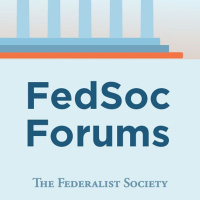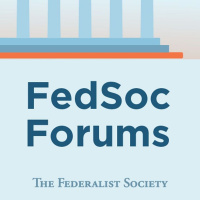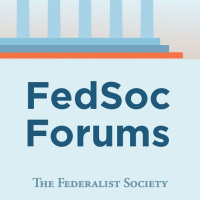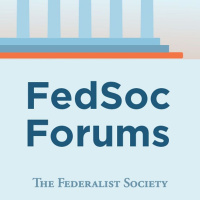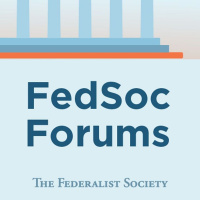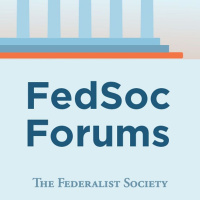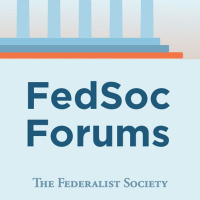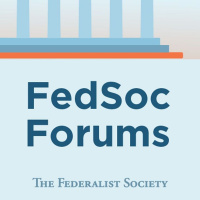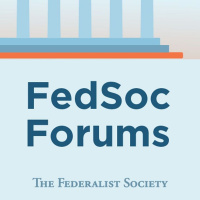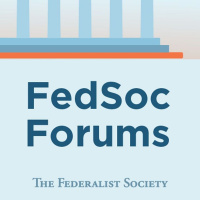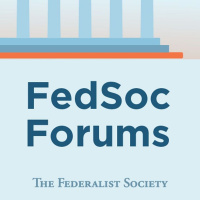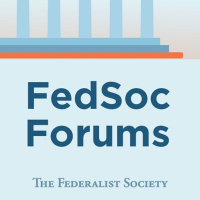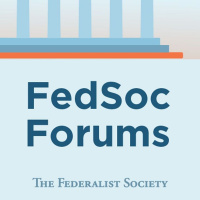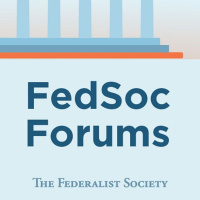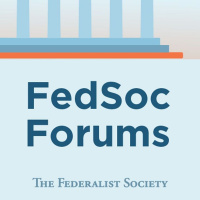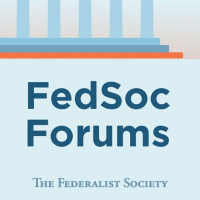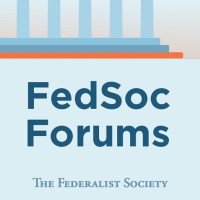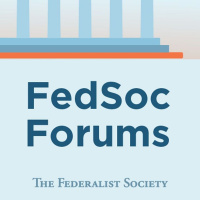Sinopsis
This series of podcasts features experts who analyze the latest developments in the legal and policy world. The podcasts are in the form of monologues, podcast debates or panel discussions and vary in length. The Federalist Society takes no position on particular legal or public policy issues; all expressions of opinion are those of the speakers. We hope these broadcasts, like all of our programming, will serve to stimulate discussion and further exchange regarding important current legal issues.
Episodios
-
Courthouse Steps Oral Argument: Mahmoud v. Taylor
29/04/2025 Duración: 53minIn Mahmoud v. Taylor, the Supreme Court will decide whether parents have the right to be notified and opt their children out of classroom lessons on gender and sexuality that violate their religious beliefs.In 2022, the Montgomery County, Maryland, School Board introduced storybooks for pre-K through fifth-grade classrooms covering topics like gender transitions and pride parades. Maryland law and the Board’s own policies provide parents the right to receive notice and opt their kids out of books that violate their religious beliefs. However, when parents attempted to exercise this right, the School Board eliminated notice and opt-outs altogether. In response, a diverse coalition of religious parents, including Muslims, Christians, and Jews, sued the School Board in federal court. The parents argue that storybooks are age-inappropriate, spiritually and emotionally damaging for their kids, and inconsistent with their beliefs.Last year, the Fourth Circuit upheld the School Board’s policy, ruling tha
-
Courthouse Steps Oral Argument: Kennedy v. Braidwood Management, Inc.
29/04/2025 Duración: 55minIn Kennedy v. Braidwood Management, Inc. the Supreme Court will consider "Whether the U.S. Court of Appeals for the 5th Circuit erred in holding that the structure of the U.S. Preventive Services Task Force violates the Constitution's appointments clause and in declining to sever the statutory provision that it found to unduly insulate the task force from the Health & Human Services secretary’s supervision."In Kennedy v. Braidwood Management, Inc., several Christian-owned businesses, along with six individuals in Texas, brought suit alleging that the Affordable Care Act's preventative services coverage requirement was illegal and unconstitutional. They contend it violates the Religious Freedom Restoration Act, as the ACA required them to fund preventative services that conflicted with their religious beliefs, and that it violates the Constitution’s Appointments Clause, given the controlling effect of a non-appointed advisory body over which preventative treatments were required. Given those is
-
A Conversation on the Right: The Future of the SEC & Cryptocurrency
24/04/2025 Duración: 57minWhat does the new administration mean for cryptocurrency regulation and the balance of authority between the SEC and the states? Traditionally, Republican-led SECs and financial regulators have favored federal preemption of state authority. Under the Biden Administration, however, many red states invoked their consumer protection powers to challenge federal agency actions and defend federalism. This panel will explore ongoing state litigation against the SEC over the definition of a security and examine how the evolving federal-state dynamic could shape cryptocurrency regulation.Featuring: Justin Clark, Civil Chief, Kentucky Office of the Attorney GeneralPaul N. Watkins, Managing Partner, Fusion Law PLLCEric Wessan, Solicitor General, Iowa Office of the Attorney GeneralModerator: Katie Biber, Chief Legal Office, Paradigm
-
2025 Mike Lewis Memorial Forum: The Russian Way of War
24/04/2025 Duración: 01h58sRussia’s war against Ukraine has been marked by deliberate attacks on civilians, healthcare workers, and critical infrastructure. From targeting rescue personnel with follow-up strikes to direct attacks on hospitals and maternity wards, Russia’s actions raise serious questions under the Law of Armed Conflict. Additionally, its ongoing kinetic and cyber attacks on energy infrastructure further challenge established legal norms.This Federalist Society webinar will examine how these actions violate the Law of Armed Conflict, focusing on specific incidents and responsible actors. Panelists will also explore potential legal remedies and the prospects for war crimes prosecutions.Mike Lewis served as a naval aviator before becoming a renowned law professor, respected by scholars and practitioners alike. A great friend of the Federalist Society, he spoke at numerous lawyer and student chapter events and was a dedicated member of the Executive Committee of the International & National Security Law Prac
-
Reform or Withdraw? The United States and the Future of the United Nations
24/04/2025 Duración: 58minThe United Nations was founded to promote peace, security, and international cooperation, but critics argue that it has become an inefficient bureaucracy that often works against U.S. interests. In particular, UN agencies and organizations – in which each UN Member State can choose whether or not to participate – have sometimes taken positions in conflict with what some U.S. policy makers regard as important principles and priorities. The Trump Administration recently announced that the United States will no longer participate in the U.N. Human Rights Council (UNHRC), will end all financial support for the UN Relief and Works Agency for Palestine Refugees in the Near East (UNRWA), and may withdraw from the UN Educational, Scientific, and Cultural Organization (UNESCO).Supporters, on the other hand, contend that the U.N. and its affiliated organizations remain a vital forum for diplomacy and that the United States should lead efforts to reform them rather than abandon them.Should the United States
-
Litigation Update: Martin v. United States
24/04/2025 Duración: 41minWhen federal law enforcement raids the wrong home, do innocent homeowners have any legal recourse? The answer is more complicated than one might expect. Over the years, the Supreme Court has limited the ability to bring constitutional claims against federal officers, citing the absence of a congressionally authorized cause of action. However, Congress has provided a remedy for certain torts committed by federal law enforcement through the law-enforcement proviso of the Federal Tort Claims Act—legislation enacted in response to notorious federal raids in the 1970s. Yet even this statutory remedy may fall short today.In Martin v. United States, the Supreme Court will determine whether the law-enforcement proviso can overcome sovereign immunity and whether an innocent family, whose home was mistakenly raided by an FBI SWAT team, has a path to relief. Join us for an in-depth discussion on the implications of this case and the broader question of accountability for federal law enforcement.Featuring: Patrick
-
The Case of Mahmoud Khalil: Free Speech or National Security?
24/04/2025 Duración: 01h40sMahmoud Khalil, a Palestinian green card holder, was detained by ICE on March 8 and faces deportation for his involvement in the protests and disruptions at Columbia University related to the war between Hamas and Israel. The U.S. government cites an immigration law provision allowing his deportation because of “serious adverse foreign policy consequences.” Critics have argued that the government's action is retaliation for his speech. How does the Constitution apply in the case of non-citizens legally present in the U.S.? What is the role of the courts here? Join us on April 1 at 11 AM EST for a conversation between Ilya Shapiro, Senior Fellow and Director of Constitutional Studies at the Manhattan Institute and Conor Fitzpatrick, Supervising Senior Attorney at the Foundation for Individual Rights and Expression (FIRE). Their conversation will be moderated by Casey Mattox, Vice President of Legal Strategy at Stand Together. Featuring: Conor Fitzpatrick, Supervising Senior Attorney, Foundation for
-
Prosecution Laches: No Good Deed Goes Unpunished!
23/04/2025 Duración: 01h06minProsecution laches is an infrequently used equitable doctrine that bars enforcement of a patent when the patentee has unreasonably delayed prosecution in a way that prejudices others. It is most commonly used by accused infringers as a defense in patent litigation, although the USPTO can also use it as a basis for refusing allowance. Regardless, it is most often used against the backdrop of multiple continuation applications.Continuation applications are applications which all follow from (i.e., claim priority to) a single earlier application. Creating “families” of patent applications in this way is a very common practice and allows the patent owner to claim different embodiments of the original invention in response to changes in marketplace and/or technological evolution. In Sonos Inc. v. Google LLC, currently on appeal to the Federal Circuit, the district court, following a jury verdict in favor of the patentee, found Sonos’ patents unenforceable due to prosecution laches, despite Sonos
-
A Seat at the Sitting - April 2025
23/04/2025 Duración: 01h26minEach month, a panel of constitutional experts convenes to discuss the Court’s upcoming docket sitting by sitting. The cases covered in this preview are listed below.Kennedy v. Braidwood Management (April 21) - Appointments Clause; Issue(s): Whether the U.S. Court of Appeals for the 5th Circuit erred in holding that the structure of the U.S. Preventive Services Task Force violates the Constitution's appointments clause and in declining to sever the statutory provision that it found to unduly insulate the task force from the Health & Human Services secretary’s supervision.Parrish v. United States (April 21) - Federal Civil Procedure; Issue(s): Whether a litigant who files a notice of appeal after the ordinary appeal period under 28 U.S.C. § 2107(a)-(b) expires must file a second, duplicative notice after the appeal period is reopened under subsection (c) of the statute and Federal Rule of Appellate Procedure 4.Commissioner of Internal Revenue v. Zuch (April 22) - Taxes; Issue(s): Whether a
-
Litigation Transparency Act of 2025: Patents, Policy, and Legal Ethics
22/04/2025 Duración: 59minPrompted by the reintroduction of federal Litigation Transparency Act legislation, this panel will address a variety of issues raised by litigation funding with a special focus on patent litigation. Panelists will provide an overview of the Act and consider likely reactions from various constituencies, giving possible policy arguments for and against litigation funding disclosure. The panel will also consider constitutional and practical dimensions of funding disclosure, and the possible ethical issues raised by litigation funding. Featuring: Dean Kristen Osenga, Associate Dean for Academic Affairs, Austin E. Owen Research Scholar & Professor of Law, The University of Richmond School of Law Courtney Quish, Managing Director, Intellectual Property Finance Group at Fortress Investment Group Jonathan Stroud, General Counsel, Unified Patents Paul Taylor, Visiting Fellow, National Security Institute at George Mason University's Antonin Scalia Law School Moderator: Kacie Donovan, Associate, Greenberg Trauri
-
Who is the Prosecutor Here?: Rule 48(a) and the Michael Flynn, January 6, and Eric Adams Cases
22/04/2025 Duración: 01h02minThe Federal Rule of Criminal Procedure 48(a) reads, “The government may, with leave of court, dismiss an indictment, information, or complaint. The government may not dismiss the prosecution during trial without the defendant's consent.” This rule has recently been used by the Justice Department in cases like the Mayor Eric Adams case and January 6th cases. In both instances, judges have questioned the reasons for the dismissal and revealed unsolved conflict between permissive and restrictive views of the judge's role, both to explore executive decisions of the prosecution and whether to dismiss indictments with or without prejudice to their later renewal. This panel will discuss the rule and its recent uses, along with questions regarding the government’s motivation to dismiss such cases and just how far judicial review can and ought to go when approving the dismissals.Featuring:Prof. Paul Cassell, Ronald N. Boyce Presidential Professor of Criminal Law and University Distinguished Professor
-
Courthouse Steps Decision: Bondi v. VanDerStok
17/04/2025 Duración: 46minBondi v. VanDerStok concerned whether the ATF's 2022 update to its regulations under the Gun Control Act of 1968 (GCA), which articulated that federal law requirements that apply to the manufacture and sale of standard firearms also apply to "ghost guns" --readily convertible weapons parts or receiver kits-- exceeds the mandate of the same. The ATF argued it simply clarified what had already been true in response to the notable rise in the use of ghost guns. The challengers, including two individual gun owners and a gun advocacy organization, alleged the updated regulations exceeded the statutory authority granted to the ATF and brought a facial challenge. The Court heard oral argument on October 8, 2024.On March 26, 2025, a 7-2 Court ruled the ATF's rule is not facially inconsistent with the GCA.Join us for a Courthouse Steps Decision program where we will break down and analyze this decision and what its potential effects might be.Featuring:Zack Smith, Legal Fellow and Manager, Supreme Court and Appellate A
-
Tracking and Ending Religious Discrimination
17/04/2025 Duración: 01h02minA new project sponsored by a coalition of organizations seeks to track the various ways that federal and state programs discriminate against religious participants in a range of funding programs despite a series of Supreme Court cases holding such discriminatory treatment unconstitutional. The Religious Discrimination Tracker is a project of the EPIC Coalition (a multi-faith coalition that focuses on education), the Teach Coalition, the Notre Dame Religious Liberty Clinic, and the Notre Dame Educational Law Project. The site seeks to identify ways to ensure equal access to funding by religious participants, particularly in education. In this webinar, Professor Nicole Stelle Garnett (Notre Dame Law) will discuss this new project and expand on her argument in a November 2024 Wall Street Journal op-ed that a range of federal programs "reflect[] an outdated understanding of the First Amendment that assumes the Constitution requires the exclusion of religious expression from public life and programs."Featuring:Pro
-
The Weaponization of DOJ?
16/04/2025 Duración: 59minHigh-profile politically adjacent actions (including prosecutions, pardons, & dismissals) from both the current and past administrations have inspired increasing concern over the potential weaponization of the U.S. Department of Justice. This concern has led to recent executive actions in this area --President Trump issued an Executive Order on the first day back in office on "Ending the Weaponization of the Federal Government," and AG Bondi has created a task force aimed at "Restoring the Integrity and Credibility" of the DOJ. These actions prompt the question: has the DOJ actually been weaponized, and if so, in what ways? What is the role of the DOJ in the criminal justice process, and what responsibility does it have as a part of the executive branch to represent the will of the president? Have the actions of both the past administrations in bringing cases against political opponents, seeking to dismiss charges from potential allies, and shielding friends and family from potential prosecution been
-
Courthouse Steps Decision: FDA v. Wages and White Lion Investments, L.L.C.
15/04/2025 Duración: 01h16sUnder the Family Smoking Prevention and Tobacco Control Act, the FDA must approve new tobacco products. Wages and White Lion Investments (dba Trion Distribution) and Vapetasia manufacture and sell flavored nicotine-containing liquids for use in refillable e-cigarette systems. They applied for FDA approval in 2020; about ten months later, the FDA announced new requirements for approval and, based on those requirements, denied the applications citing the deficiency. The manufacturers challenged the denial and the Fifth Circuit, sitting en banc, found the FDA's actions were arbitrary and capricious. SCOTUS heard oral argument on Monday, December 2, 2024. On April 2, 2025, the Court issued a decision vacating the Fifth Circuit in a 9-0 opinion written by Justice Alito. Justice Sotomayor wrote a concurring opinion. Join us for a Courthouse Steps Decision panel discussion, where a group of experts will discuss this important case and its potential effects not just for regulated parties but in the broader administra
-
Agency Independence and Accountability to the Executive
10/04/2025 Duración: 01h06minPresident Trump’s February 18 “Ensuring Accountability for All Agencies” Executive Order directs independent regulatory agencies to submit for review all proposed and final significant regulatory actions to the Office of Information and Regulatory Affairs (OIRA) within the Executive Office of the President. This joint webinar, sponsored by the Administrative Law and the Corporations, Securities & Antitrust Practice Groups, will discuss the real-world implications of this order for independent agencies, including the Federal Communications Committee and the Federal Trade Commission.Featuring:J. Howard Beales, III, Professor Emeritus of Strategic Management and Public Policy, School of Business, The George Washington UniversityHon. Susan E. Dudley, Founder, GW Regulatory Studies Center & Distinguished Professor of Practice, Trachtenberg School of Public Policy & Public Administration, The George Washington UniversityThomas M. Johnson, Jr. Partner, Wiley Rein LLPProf. Adam White, S
-
Courthouse Steps Oral Argument: Oklahoma v. EPA and EPA v. Calumet Shreveport Refining, LLC
10/04/2025 Duración: 40minOn March 25th, 2025, the Supreme Court will hear oral argument to resolve two circuit splits arising under the Clean Air Act (CAA) provision regarding judicial venue: EPA v. Calumet Shreveport Refining, L.L.C. (23-1229), and Oklahoma v. EPA (23-1067). The outcome of these cases will hinge on the Court’s interpretation of the CAA’s unique venue provision, 42 U.S.C. § 7607(b)(1). The CAA states that challenges to “nationally applicable” actions may be filed only in the D.C. Circuit. 42 U.S.C. § 7607(b)(1). Conversely, challenges to CAA actions that are “locally or regionally applicable” may generally be filed only in the appropriate circuit court for the region. Id. But there is an exception: actions that are “based on a determination of nationwide scope or effect” must be filed in the D.C. Circuit “if in taking such action the Administrator finds and publishes that such action is based on such a determination.” Id.What is the meaning and sco
-
The California Wildfires and America’s Housing Challenges
10/04/2025 Duración: 58minHow California’s state and local governments act in the wake of the devastating wildfires will be a harbinger of whether America can deal with its housing issues. California’s housing crisis was dire before the Southern California wildfires were sparked. As Jim Burling has recounted in his new book, Nowhere to Live, half of the nation’s homeless population lives in California. And between 2020 and 2023, California’s homeless population increased by 5.8 percent.Some argue that this housing crisis has only been exacerbated by errant government policies like exclusionary zoning and restrictive permitting conditions because these stifle the production of affordable housing. Others contend, however, that these restrictions are necessary not only to promote the orderly development of California’s land, but also to help prevent and avoid destruction done by wildfires and other natural disasters.Now, after so much property has been razed to the ground, how are California’s state an
-
Courthouse Steps Oral Argument: Federal Communications Commission v. Consumers’ Research
10/04/2025 Duración: 48minThe Federal Communications Commission (FCC) is authorized by Congress to regulate interstate and international communications and, as part of that, to maintain a universal service fund that requires telecommunications carriers to contribute quarterly based on their revenues. In order to calculate these contribution amounts, the FCC contracts the help of the Universal Service Administrative Company (USAC).The constitutionality of these delegations of power—to the FCC by Congress and to USAC by the FCC—are now being challenged in court by Consumers’ Research. Join this FedSoc Forum to discuss this case’s oral argument, delivered on March 26, 2025.Featuring:Prof. Chad Squitieri, Assistant Professor of Law, Catholic University of AmericaModerator: Adam Griffin, Separation of Powers Attorney, Pacific Legal Foundation--To register, click the link above.
-
Courthouse Steps Oral Argument: Medina v. Planned Parenthood South Atlantic
10/04/2025 Duración: 56minIn July of 2018, Governor Henry McMaster of South Carolina issued an executive order to terminate the inclusion of Planned Parenthood in the Medicaid program. The Department of Health and Human Services then informed Planned Parenthood that they were no longer qualified to provide services to Medicaid beneficiaries, which prompted lawsuits both from Planned Parenthood and beneficiaries seeking to enforce their right to “free-choice-of-provider,” included in a 1967 Medicaid provision. This case, argued on April 2, asks whether this provision unambiguously confers a private right upon a Medicaid beneficiary to choose a specific provider. Join this Courthouse Steps webinar as we discuss this case and the oral arguments presented in court.Featuring:Eric Wessan, Solicitor General, Iowa Office of the Attorney GeneralModerator: Ryan Bangert, Senior Vice President, Strategic Initiatives & Special Counsel to the President, Alliance Defending Freedom--To register, click the link above.

